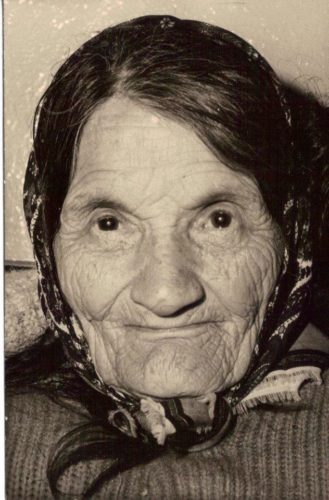What I remember most about my Safta is her eyes. They crinkled into sunbursts when she smiled.
She smiled a lot. In my memories.
But, never in pictures.
In pictures she is stern, solemn. A lingering self-consciousness about her teeth, my mother explained.
I’m not always sure that I believe in God.
There is too much sadness, too many unanswered prayers. Too many seeking hands falling into nothingness.
But I do believe in my Safta.
I see her sometimes. When the house is still and I’m alone. When I wake from a restless sleep or fall into a lucid dream.
Always she is smiling, her hands open, her eyes sparkling with some inner light.
My Safta died when I was 3. Or maybe 4. I’m not sure.
The few memories I have of her are dreamlike and vivid all at once.
Feeding stray cats in her yard in Bat Yam, playing catch with a brightly colored ball, nibbling at the sweet orange segments she handed me one by one.
And then there are the other memories. The ones that came later, years and years after she died.
The time that I wasn’t sure if I should marry the boy I was dating because he wasn’t Jewish. But then she came to him in a dream… him! Not me. And smiled and nodded her blessing. And, though he had never even seen a picture of her, he told me of the sunbursts in her eyes, and the floor length hair that stayed jet-black until she died, and the way she nodded, just so… sweetly, like a sparrow.

And she did go. I learned the next day that that very hour she passed out of this world and into the next.
But, was it God that she went to? I’m not sure.
My Safta was sure. The stories about her faith in God are passed from one family member to another like precious glimmers of validation.
There was the time she visited her daughters in the labor camps in Libya and told the other occupants stories of the bright futures that lay in store from them… stories that God had whispered in her ear, stories that many of the women found her later, in Israel, to tell her had come true.
There was the time there was a bombing in the Libyan town they were living in, and all the buildings were flattened… except for the synagogue where my Safta and the other Jewish residents huddled, praying for divine intervention.
There was the time when a handsome man came into the restaurant that my great-grandfather owned in Alexandria, and spoke casually about God’s existence, flippantly. And, my Safta, who was waiting his table, became enraged by his disrespect of the God she loved so much and slapped him square across the face.
That flippant man became my Saba, and later a respected Rabbi. But, it was my Safta who had first led him back to God.
When I was a child, people would always tell me I had my Safta’s gentleness, her looks, her soft-spoken voice. It touched me to think that I could carry some small spark of her great flame.
And yet… what about God? What about the relentless, unwavering faith she had in Him? Why had I not inherited that, along with the crinkles by my eyes and my soft voice?
I’m not sure. Perhaps one day my Safta will tell me.





